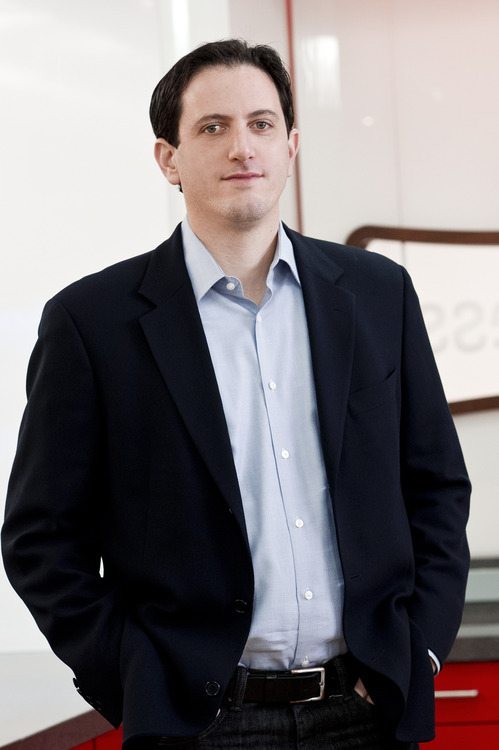Startup founders begin with building new products and end up building new companies. Ultimately, some of the most successful companies not only reinvent a product or market, they change the way people work in a way that’s reflective of what they value most, and that’s embodied in their company culture.
To find out how startup leaders think about building companies that they themselves enjoy working in, we surveyed the founders of some of the most innovative startups out there to ask them one simple question:
What do you value most about your company culture, and what’s one important way that you contribute to it?
We received some amazing, proud and insightful responses from startup founders personally, another individual within the company who was eager to chip in, and the PR or marketing team.
I love the camaraderie shared within our office. We’ve created a relaxed office environment at Company Folders, Inc,where employees can enjoy snacks, a casual dress code and group outings and lunches. We also provide flexible hours and work-at-home days
Vladimir Gendelman
Founder & CEO, Company Folders

We don’t have anything set in stone regarding company culture but … the most important thing is that everyone realizes why we are doing this: for our users. Many examples of their success stories and how our hard work pays off for them (and in turn, us!) is a big deal in my opinion.
Sahil Lavingia
Founder & CEO, Gumroad
 This company culture is still being defined largely by who we’ve hired… . We have a very fluid environment focused on moving the needle. It’s all still forming.
This company culture is still being defined largely by who we’ve hired… . We have a very fluid environment focused on moving the needle. It’s all still forming.
Gabe Weinberg
Founder & CEO, Duck Duck Go
 We’re all very proud of how close the team is. We eat lunch together every day and generally end up spending time together outside of the office. It’s this company culture that’s led to our ability to disagree with each other on product and to challenge each other to build the best product we can.
We’re all very proud of how close the team is. We eat lunch together every day and generally end up spending time together outside of the office. It’s this company culture that’s led to our ability to disagree with each other on product and to challenge each other to build the best product we can.
Zach Sims
Founder & CEO, Codecademy
 One of the neatest things about Stripe’s company culture is that everyone’s in it together: no matter what you work on from day-to-day, you’re able to pitch in anywhere in the organization. I first noticed this back when I was just a Stripe user and one of the core engineers was answering my support emails; now part of the team, I’ve found that all emails are available internally so that everyone can share their ideas. It’s less of what I individually bring to the team and instead about everyone’s combined experiences… . Basically, Stripe is an ongoing brainstorming session, and that means we can take the best of everyone’s ideas and make something lasting.
One of the neatest things about Stripe’s company culture is that everyone’s in it together: no matter what you work on from day-to-day, you’re able to pitch in anywhere in the organization. I first noticed this back when I was just a Stripe user and one of the core engineers was answering my support emails; now part of the team, I’ve found that all emails are available internally so that everyone can share their ideas. It’s less of what I individually bring to the team and instead about everyone’s combined experiences… . Basically, Stripe is an ongoing brainstorming session, and that means we can take the best of everyone’s ideas and make something lasting.
Michael Schade
Support Hacker, Stripe
 Ark continuously focuses on and encourages personal education … Because of this environment, you will always find people testing new tools and technologies, sharing best practices, exploring competitor products, networking at industry events, and learning from guest mentors … I’m always looking for new opportunities for our team members to grow whether that’s personally or professionally. I find opportunities, such as tech events, for them to expand their network and talk to others about Ark. At these events they’re able to get away from their computers, recharge, meet similar-minded folks, and learn what others are doing in their industry.
Ark continuously focuses on and encourages personal education … Because of this environment, you will always find people testing new tools and technologies, sharing best practices, exploring competitor products, networking at industry events, and learning from guest mentors … I’m always looking for new opportunities for our team members to grow whether that’s personally or professionally. I find opportunities, such as tech events, for them to expand their network and talk to others about Ark. At these events they’re able to get away from their computers, recharge, meet similar-minded folks, and learn what others are doing in their industry.
Navi Ganancial
VP of Marketing, Ark
 I value everyone’s passion. This is only possible because we have a Mission that everyone feels is life-changing: Bring education to those who didn’t have access to it or couldn’t afford it.
I value everyone’s passion. This is only possible because we have a Mission that everyone feels is life-changing: Bring education to those who didn’t have access to it or couldn’t afford it.
Ryan Carson
Founder & CEO, Treehouse
 Our core values, TAGFEE (ed: Transparent and Authentic, Generous, Fun, Empathetic, Exceptional), are my favorite part of Moz’s company culture. It’s an amazing framework that helps to guide our decisions in big and small ways throughout the company. In meetings about a product we’re building for customers, we ask about whether a feature or a UX element showcases our style/personality authentically. In a discussion about recruiting bonuses, we’ll compare our plans to our core values of transparency and generosity. When we work on product strategy, we question our empathy to customers and their desired outcomes.
Our core values, TAGFEE (ed: Transparent and Authentic, Generous, Fun, Empathetic, Exceptional), are my favorite part of Moz’s company culture. It’s an amazing framework that helps to guide our decisions in big and small ways throughout the company. In meetings about a product we’re building for customers, we ask about whether a feature or a UX element showcases our style/personality authentically. In a discussion about recruiting bonuses, we’ll compare our plans to our core values of transparency and generosity. When we work on product strategy, we question our empathy to customers and their desired outcomes.
I get to contribute to this in many ways, but the first and foremost is leading by example. My actions and my involvement in every aspect on Moz has to be incredibly TAGFEE, and living up to that standard is hard, but incredibly worthwhile. I don’t doubt that although we are getting to make great software and serve tens of thousands of customers, Moz’s greatest contribution to the startup, technology and Seattle entrepreneurship scene may be our core values. That’s pretty exciting.
Rand Fishkin
Founder & CEO, SEOMoz
 This is a timely question for oDesk. Last week we debuted our new tagline, ‘Love the way you work,’ and asked everyone who works here, as well as our users, why they love the way they work. We got thousands of responses, such as this one from our Facebook page: ‘I love the way I work because I have the freedom to do what I love with the skills I enjoy using. I am able to witness the first time my baby smiles, and all other moments with loved ones which are simply priceless.’ I love oDesk because we are creating boundless new opportunity in the way people can work, and I feel the impact we’re having every day. The ability to do something great for the world while doing something we love is incredibly exciting — and that excitement permeates our company culture.
This is a timely question for oDesk. Last week we debuted our new tagline, ‘Love the way you work,’ and asked everyone who works here, as well as our users, why they love the way they work. We got thousands of responses, such as this one from our Facebook page: ‘I love the way I work because I have the freedom to do what I love with the skills I enjoy using. I am able to witness the first time my baby smiles, and all other moments with loved ones which are simply priceless.’ I love oDesk because we are creating boundless new opportunity in the way people can work, and I feel the impact we’re having every day. The ability to do something great for the world while doing something we love is incredibly exciting — and that excitement permeates our company culture.
Gary Swart
CEO, oDesk
 The most satisfying aspect of our company’s work culture is that people take initiative to find innovative solutions to problems wherever they find them, rather than just sitting comfortably within their own departments. People don’t use the phrase ’that isn’t in my job description.’ I think I’ve been able to embody this concept by doing customer service shifts a few times a year. The whole company has followed suit, and we each spend 2-3 days a year doing a stint in service so that all of us can stay close to our customers.
The most satisfying aspect of our company’s work culture is that people take initiative to find innovative solutions to problems wherever they find them, rather than just sitting comfortably within their own departments. People don’t use the phrase ’that isn’t in my job description.’ I think I’ve been able to embody this concept by doing customer service shifts a few times a year. The whole company has followed suit, and we each spend 2-3 days a year doing a stint in service so that all of us can stay close to our customers.
Mike Evans
Founder & COO, GrubHub
 Our company culture is all about empowering talented people to get stuff done in the way they feel most comfortable. On any given day, you’ll see people riding motorized scooters around the office, engaged in competitive ping pong ball tournaments, snacking in our fully stocked kitchen, and only half of the team wearing shoes. It’s this laid back environment that gives us the space and energy to work hard and tackle whatever the day brings. Each Braintreep is equally responsible for maintaining this positive energy. It’s one of our favorite ways to contribute.
Our company culture is all about empowering talented people to get stuff done in the way they feel most comfortable. On any given day, you’ll see people riding motorized scooters around the office, engaged in competitive ping pong ball tournaments, snacking in our fully stocked kitchen, and only half of the team wearing shoes. It’s this laid back environment that gives us the space and energy to work hard and tackle whatever the day brings. Each Braintreep is equally responsible for maintaining this positive energy. It’s one of our favorite ways to contribute.
Caitlin Simms
Marketing Manager, Braintree
 Seamless is a 12-year-old company with more than 250 employees, but our history as a tech startup informs our company culture. In order to maintain the nimble development processes and personality of a startup, our Executive Management Team encourages transparency and information-sharing, context over control in management and risk-taking. Our new office, which we moved into last year, was deliberately designed with an open layout where Seamless’ top execs work alongside less seasoned employees. We encourage collaboration, creativity and the exchange of ideas, and we wanted our new office to reflect those values.”
Seamless is a 12-year-old company with more than 250 employees, but our history as a tech startup informs our company culture. In order to maintain the nimble development processes and personality of a startup, our Executive Management Team encourages transparency and information-sharing, context over control in management and risk-taking. Our new office, which we moved into last year, was deliberately designed with an open layout where Seamless’ top execs work alongside less seasoned employees. We encourage collaboration, creativity and the exchange of ideas, and we wanted our new office to reflect those values.”
Jonathan Zabusky
CEO, Seamless
Conclusion
No two companies responded with the same values and practices. Even when companies did similar things, like Stripe’s core engineers responding to customer support emails and GrubHub’s entire team doing customer service stints, the purpose of it, the values they served, and the histories that brought them to that point differed. It’s awesome that however disparate their corporate identities cultures may be, they’re both tied to giving users an amazing customer support experience.
Now that you know what each company practices to achieve the company culture they want, what kind of culture do you want to create in your company? We’d love to know what daily practices you use to build and maintain your company’s cultural values.

